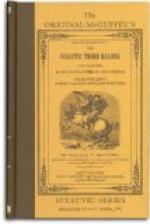8. One victory in particular, when they captured a banner which the Danes thought enchanted, led Alfred to take bolder steps. He wished to find out the exact condition of the enemy, and, for this purpose, disguised himself as a harper and entered their camp. He was so successful in his disguise that he remained there some days, even being admitted to the tent of the Danish leader Guthrum.
9. He found their entire army living in careless security, and so he determined to make a sudden and bold attack on them, to try and rid his country once more of these cruel invaders. He summoned his people about him from far and wide. Many of them had long thought their beloved king dead, but now all eagerly obeyed his call.
10. He at once led them against that part of the camp which he had seen to be most unguarded. The attack was entirely unexpected; and, although the Danes were greater in numbers, they were defeated with great slaughter. Some of them, with their leader, fled to a fortified place, but were soon obliged to surrender.
11. Alfred granted them their lives, and settled them in a part of his kingdom where nearly all his own people had been destroyed. He hoped by this to change obstinate enemies into useful friends who would protect England from further attacks of their own countrymen. However, some years later, when the Danes made another invasion, these people joined them in fighting against Alfred, but he soon succeeded in driving them all out of the country.
12. Much as Alfred did for his people in war, he did more in time of peace. Above all else he gave careful attention to their education. He rebuilt the monasteries and aided the young University of Oxford. He also founded many schools, to which every owner of a certain portion of land was compelled to send his children.
13. But he did as much good by the example that he set as by these acts. His time was divided into three parts. One was given to business, one to refreshment by sleep and food, and the third to study and devotion. Clocks and watches, and probably even sundials, were then unknown, so these divisions were marked by burning candles of equal lengths.
14. Alfred did not study for his own pleasure merely, but translated and wrote many works for the good of his people, using the simple language which they could easily understand and enjoy. His person was handsome and dignified, full of grace and activity. But the more noble beauty was within, in the enlightened mind and virtuous heart of the king. After his name, which has its place on an ancient record of English kings, is written the noble title of “Truth Teller.”
Definitions.—2. Mon’as-ter-y, a religious house where monks live. 5. In-va’sion, the warlike entrance of an army. 8. Dis-guised’, hidden by an unusual dress and appearance. 12. U-ni—ver’si-ty, a school of the highest grade, in which are taught all branches of learning. 14. Trans-lat’ed, changed from one language to another. En-light’ened, well informed.




